Welcome to our article on the intelligence of German shorthaired pointers. In this exploration, we delve into everything we know about their cognitive abilities. We will showcase fascinating insights that shed light on just how smart these remarkable dogs truly are. Stay tuned for an enlightening journey into the world of German shorthaired pointer intelligence!
About the Breed

Bred in Germany originally, these dogs are now world-famous hunters and companion animals.
©iStock.com/Eriklam
The German shorthaired pointer, also known as GSP, is a medium-sized breed that possesses an impressive combination of strength and agility. Males typically stand between 23 to 25 inches tall at the shoulder and weigh anywhere from 55 to 70 pounds. Females are slightly smaller, measuring around 21 to 23 inches in height and weighing between 45 to 60 pounds. With a lifespan of approximately 10 to 12 years, these loyal companions offer their unwavering devotion for a significant portion of one’s life.
GSPs are celebrated for their versatility in various tasks, making them highly sought-after gundogs. Their unwavering enthusiasm for vigorous exercise, coupled with positive training techniques, allows them to excel in multiple endeavors. These dogs thrive on mental stimulation and physical activity. Hence they require ample opportunities to burn off energy through engaging in exercises such as running or swimming.
One cannot help but be captivated by the striking appearance of the GSP breed. Their coat comes predominantly in solid liver coloration (a reddish brown shade) or liver and white patterns, which set them apart from other breeds. Complementing this unique coat are dark eyes that shine with both enthusiasm and friendliness. These traits further endear this breed to its admirers.
People bred these dogs specifically for endurance during long days. They are used to working tirelessly in fields or near bodies of water like lakes. GSPs possess remarkable power, speed, agility, and overall athleticism, which contribute significantly to their capabilities as exceptional hunting dogs.
Are German Shorthaired Pointers Smart?
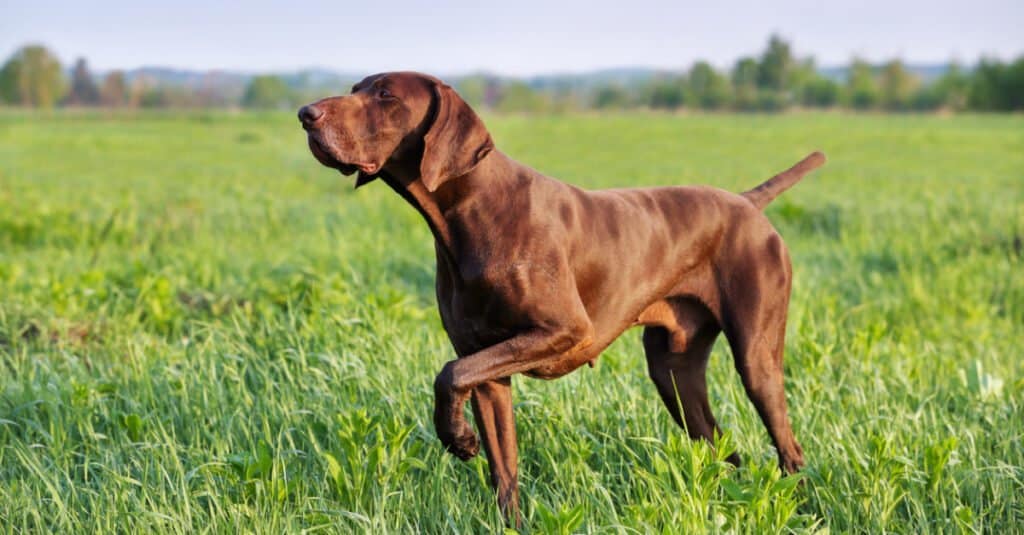
With its beautiful coat and regal pose, the brown German Shorthaired Pointer is eye-catching.
©Vitalii_Mamchuk/Shutterstock.com
Yes, they are! When it comes to intelligence, German shorthaired pointers have certainly made a name for themselves. Renowned for their sharp minds and exceptional problem-solving abilities, these dogs consistently prove that they possess an impressive level of intelligence.
Learning Aptitude: How Quick and Adaptive Are They?
German Shorthaired Pointers have a quick wit and the ability to learn new tasks with ease. Their high levels of intelligence make them highly adaptable. This enables them to excel in various roles, such as hunting companions, search and rescue dogs, or even therapy animals.
One aspect that sets German shorthaired pointers apart is their incredible trainability. These intelligent canines eagerly soak up information like sponges. This makes training sessions both enjoyable and rewarding experiences for both dog and owner alike. With proper guidance, consistency, and positive reinforcement techniques, these four-legged learners quickly grasp commands and concepts.
The Cognitive Capabilities of German Shorthaired Pointers
Not only do German shorthaired pointers exhibit remarkable cognitive skills, but they also possess an intuitive nature that aids in understanding human emotions. They have the uncanny ability to discern subtle cues from their owners’ body language or tone of voice. This innate sensitivity allows them to form strong bonds with their human counterparts while responding empathetically to their needs.
Furthermore, the breed’s astute problem-solving capabilities are often put on display through engaging activities such as puzzle toys or canine sports like agility trials. These mental challenges not only provide physical exercise but also stimulate the GSP’s intellect by presenting them with puzzles they must solve using logic and creativity.
Intelligence Ranking: Where Does the German Shorthaired Pointer Stand Among Other Breeds?
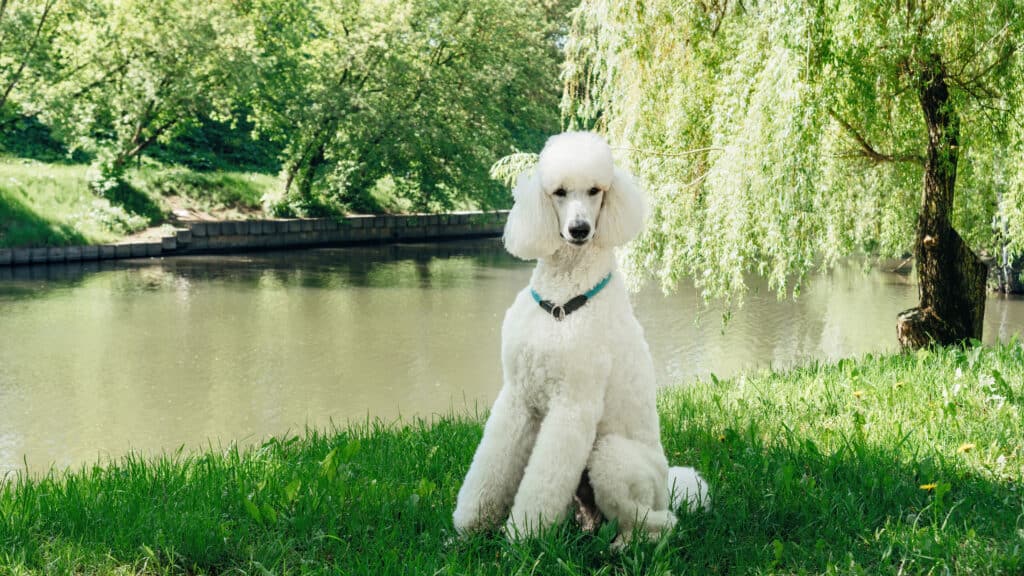
Poodles and German shorthaired pointers are on a similar level of intelligence.
©nieriss/Shutterstock.com
When evaluating the intelligence of different dog breeds, it is essential to consider the German shorthaired pointer’s cognitive abilities in relation to other breeds. Every breed possesses unique characteristics and aptitudes. Comparing the intelligence of a German Shorthaired Pointer to specific types of dogs can provide valuable insights into their relative intelligence. Here are three dogs of similar intelligence to the GSP.
One breed that often comes up for comparison is the border collie. They are renowned for their exceptional problem-solving skills and unmatched working instincts. The border collie stands as one of the most intelligent dog breeds. Like the GSP, they have the ability to quickly learn complex commands and excel in various tasks. This has earned them widespread recognition in fields such as herding competitions and obedience trials.
Another noteworthy breed renowned for its intellect is the poodle. With an extraordinary capacity for learning and an eagerness to please their owners, poodles consistently rank among highly intelligent canines. Like the GSP, they excel in agility training and showcase remarkable adaptability across different environments. These versatile dogs demonstrate both mental acuity and a keen desire for intellectual stimulation.
In addition to these two intellectually gifted breeds, another fascinating comparison could involve the golden Retriever. Renowned for their friendly nature and unwavering loyalty, golden retrievers also possess commendable intelligence levels. They are often employed as service dogs due to their exceptional trainability and problem-solving abilities. The GSP and golden retriever both display excellent comprehension skills coupled with a strong work ethic.
Health

German shorthaired pointers come in several different coat colors.
©iStock.com/BranstonandTwiglet
In addition to their overall good health, German shorthaired pointers may be susceptible to certain conditions. One of the most common health concerns for this breed is hip dysplasia. This is a condition characterized by an abnormal formation of the hip joint. This can lead to discomfort and mobility issues in affected dogs. Another potential issue that GSPs may face is progressive retinal atrophy. This refers to a degenerative eye disease that gradually impairs vision over time.
Furthermore, certain heart diseases have been observed in German Shorthaired Pointers. These cardiac conditions can range from mild abnormalities to more severe cases that require medical intervention. To mitigate these risks, responsible breeders prioritize screening their breeding stock for such conditions before initiating any mating process.
It is also crucial for GSP owners to be aware of another critical health concern – bloat. This life-threatening condition occurs when the stomach suddenly expands and potentially twists on itself. Prompt action is imperative if bloat is suspected, as it requires immediate veterinary attention. Owners should familiarize themselves with the symptoms associated with bloat so they can quickly recognize its occurrence and take appropriate measures.
Grooming
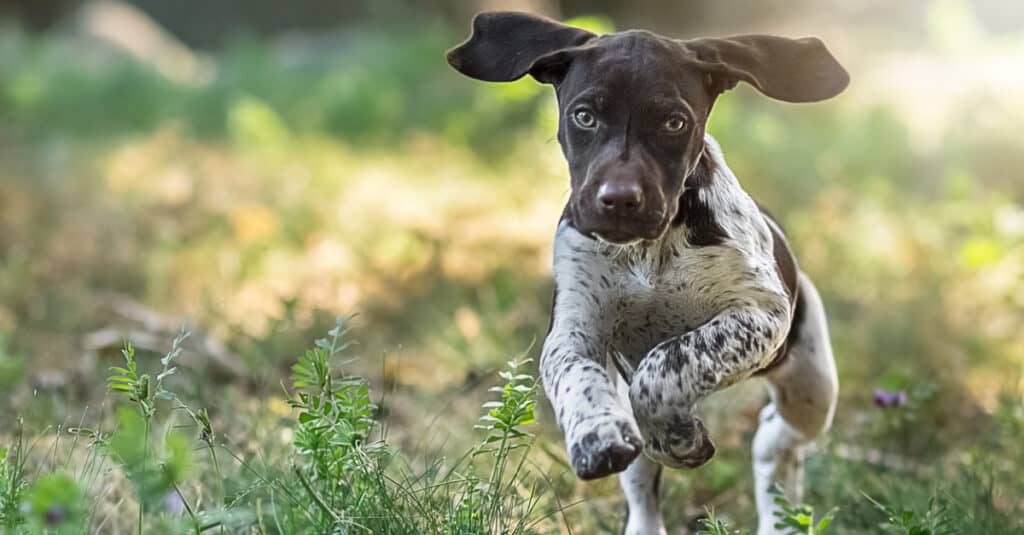
The good news is that German shorthaired pointers don’t have excessive grooming needs.
©iStock.com/BeeBuddy
Keeping a German shorthaired pointer’s coat in top shape is relatively easy for most of the year. A simple once-over with a slicker brush every few days should suffice. Despite their short coat, these dogs do shed, particularly during specific seasons. During these times, it becomes necessary to brush them more frequently to prevent loose hairs from covering your home. These stray hairs are notorious for embedding themselves in fabrics and carpets, making them difficult to remove. To tackle this issue, regular brushing sessions can help keep shedding under control.
However, grooming extends beyond just removing loose fur. It is important to pay attention to other areas as well. For instance, regularly inspecting and cleaning the ears is crucial for maintaining good hygiene. It also helps prevent any potential infections or irritations that may arise due to accumulated dirt or moisture.
Additionally, trim your German shorthaired pointer’s nails on a regular basis. This helps ensure their comfort and prevents overgrowth, which can lead to discomfort while walking or running.
While routine brushing and ear inspections are typically sufficient for keeping GSPs looking tidy throughout the year, occasional baths with gentle shampoos also contribute to maintaining their overall cleanliness and freshness.
Training Techniques and Mental Stimulation
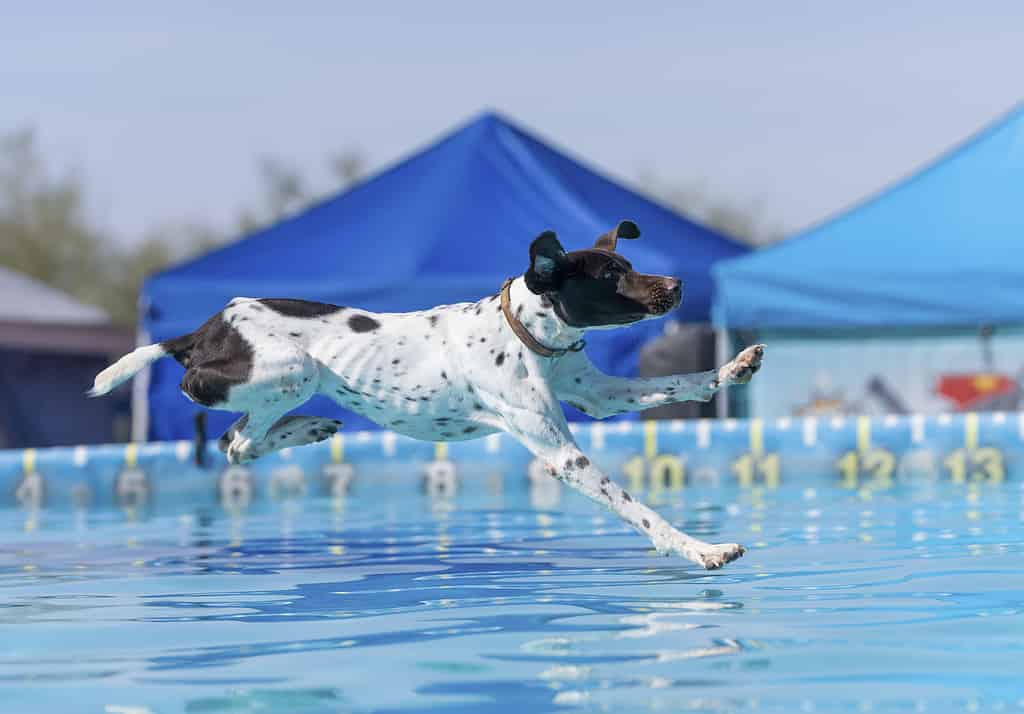
If you are a high-energy person with an active lifestyle, a German shorthaired pointer may be for you.
©iStock.com/GoDogPhoto
Early training is crucial for the German shorthaired pointer, as it sets the foundation for their development. Socialization and puppy training classes play a vital role in shaping their behavior. This ensures they grow up to be well-rounded and sociable dogs. However, the learning journey doesn’t stop there. Consistent practice of basic obedience commands is necessary throughout their lives.
What sets this breed apart is its high level of intelligence, enabling them to grasp new concepts swiftly when provided with regular training sessions. GSPs thrive on mental stimulation and eagerly engage in activities that challenge their intellect. Whether it’s teaching them new tricks or expanding their repertoire of commands, these intelligent canines excel at absorbing information like sponges.
However, it’s important to note that German Shorthaired Pointers require more than just mental exercise. They need a purpose in life! Without an outlet for their boundless energy and natural instincts, they can become bored or frustrated, leading to destructive behaviors if left unattended. From the age of six months up until three years old, GSPs may prove particularly challenging due to their exuberance and strong prey drive.
To successfully navigate through this phase with a GSP companion by your side, an owner must have an active lifestyle. These energetic dogs crave physical outlets where they can channel their intensity into positive endeavors such as long walks or vigorous playtime sessions outdoors.
History of the German Shorthaired Pointer
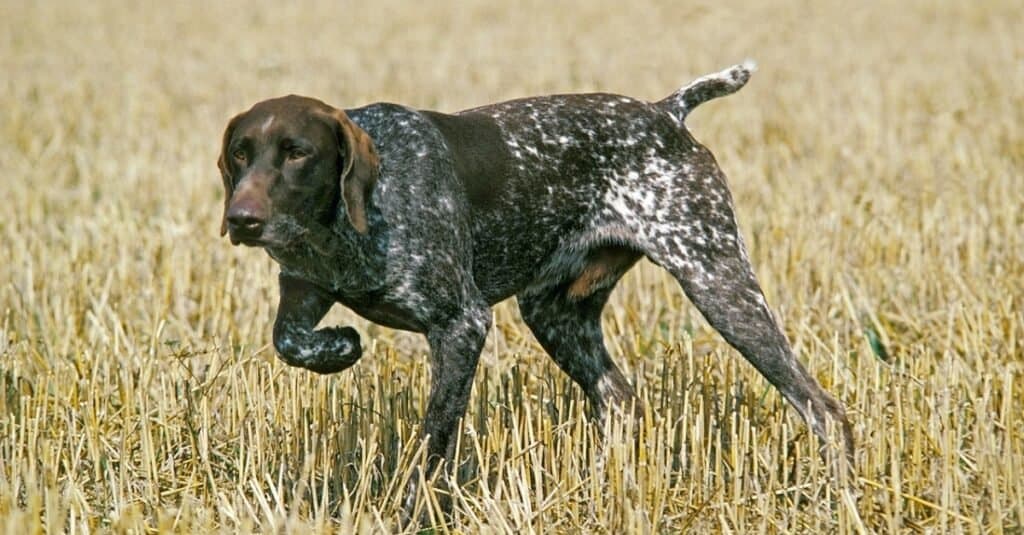
Bred to be instinctive hunting all-rounders, these multitasking dogs can hunt, point, and retrieve.
©iStock.com/slowmotiongli
Throughout the 1700s and into the 1800s, German hunters worked to create strong and versatile hunting dogs. Their hard work paid off, as the German shorthaired pointer (GSP) is still one of the top-winning breeds in hunting events today. Prince Albrecht zu Solms-Braunfels was a prominent figure in the development of this breed, crossing hounds and pointing dogs to achieve the desired qualities.
The prince and his fellow dog lovers had spectacular results in developing a dog that could do it all. It has been used to hunt various types of animals, such as birds, raccoons, possums, rabbits, and even deer. Furthermore, due to its webbed feet and sturdy body, the GSP is an amazing swimmer. As an example of the breed’s enthusiasm and versatility, Marvin from North Carolina earned 75 AKC titles!
The photo featured at the top of this post is © iStock.com/Eriklam
Ready to discover the top 10 cutest dog breeds in the entire world?
How about the fastest dogs, the largest dogs and those that are -- quite frankly -- just the kindest dogs on the planet? Each day, AZ Animals sends out lists just like this to our thousands of email subscribers. And the best part? It's FREE. Join today by entering your email below.
Thank you for reading! Have some feedback for us? Contact the AZ Animals editorial team.







